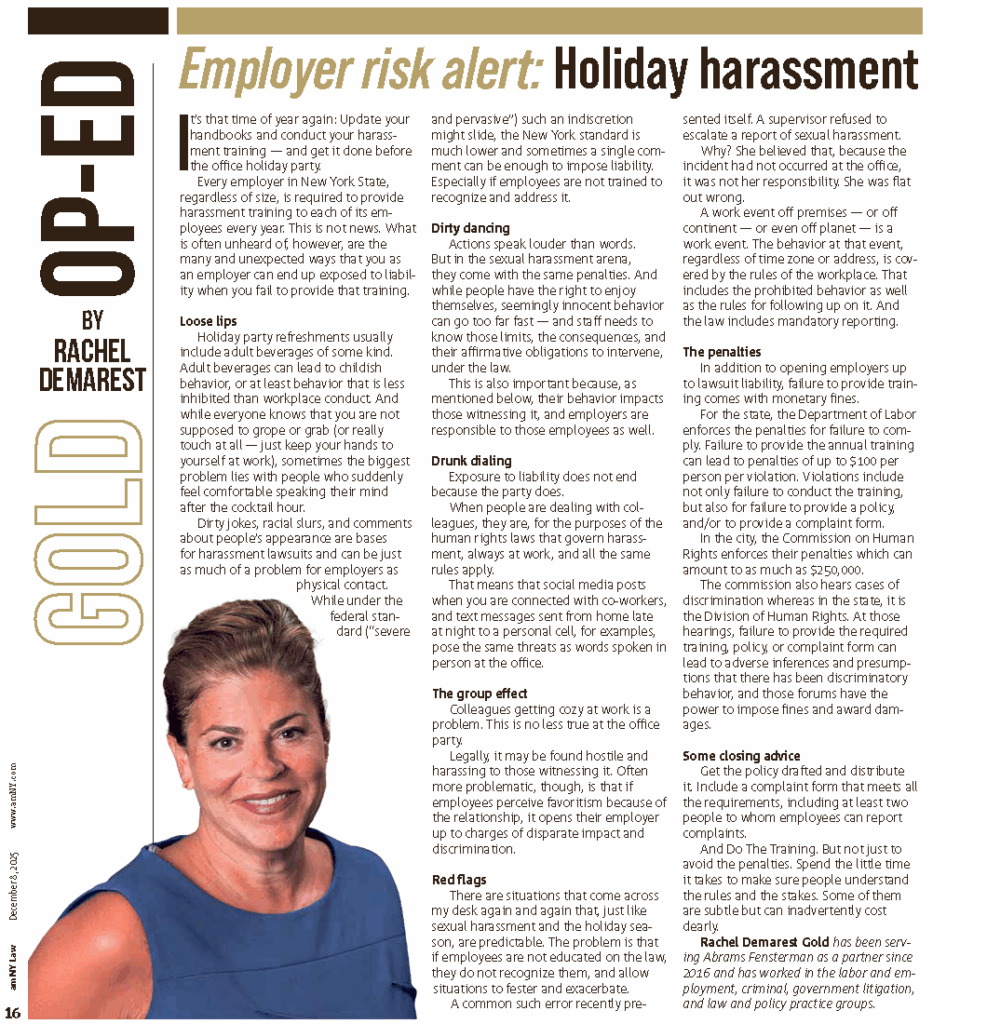By Carolyn Wolf
In the wake of shooting tragedies involving college students-Virginia Tech and Tucson, and continued concern about student suicides or suicide attempts, colleges and universities nationwide grapple with knotty questions: What can we learn, what can we do, how can we reduce the likelihood of such troubling incidents?
However, the first roadblock that such institutions often encounter in their efforts to act in the best interests of student and campus safety is a fear of lawsuits, spurred by a pervasive misunderstanding and misinterpretation of educational and health privacy laws, says Carolyn Reinach Wolf, an attorney specializing in higher education and mental health issues at Abrams Fensterman (Lake Success, New York).
While many people know of medical privacy laws like HIPAA and of educational privacy laws like the Federal Education Records Privacy Act (FERPA), Wolf asserts that few people actually know these laws, or the related state laws that govern the confidentiality of medical and educational records. Accordingly, she hands out a few pieces of advice:
1) Know the law—and especially—know the exceptions!
As important as it is for institutional leaders to “know the law,” Wolf says that “it is even more important to know the exceptions to these laws. All of these laws allow for communication of information under certain circumstances.” She cites one little known example:
“Under the FERPA education law-the federal law that governs the privacy of educational records-there is an almost unknown exception that if your child is a dependent on your tax return, you have a right to access that information. No one knows that exception. How many kids do you know on college campuses that aren’t dependents?”
Parents may also be involved in the event of underage substance abuse and student health and safety emergencies.
There are many more allowances for information disclosure without consent to officials with a legitimate interest in student education, student transfers, student financial aid, student health and safety emergencies, law enforcement and juvenile or criminal justice.
2) Use common sense.
“In situations where you need parental notification, everybody is so worried about whether they’re going to get sued if they call parents,” says Wolf, exclaiming that, “Common sense has absolutely gone out the window,” says Wolf. “Instead of thinking about the threat of a lawsuit, ask yourself, ‘what’s the most practical, common-sense response to this circumstance?’ If there’s an issue of harm-a child who is suicidal or involved in a life-threatening situation, maybe it is more important to speak to the parents first and worry about the rest later.” Wolf, a former hospital risk manager, calls this “picking your liability.”
Carolyn Reinach Wolf is a senior partner of the Abrams law firm on Long Island, N.Y. and is responsible for the mental health law practice area. She can be reached at [email protected].
“As an administrator, I’d rather be sued for allegedly violating a student’s confidentiality than for a wrongful death.”
— Carolyn Reinach Wolf
Despite widespread concern about the threat of lawsuits for possible violations, Wolf says that in reality, such lawsuits are “very hard to find” for two reasons:
“How many 18 year olds do you know that have a lawyer on retainer and what’s the likelihood of a lawsuit really happening? Second, what’s the likelihood of a court accepting a lawsuit, let alone upholding it, when a school is obviously acting in the best interests of a student or there is a health and safety issue involved?”
Her response: “Close to zero, if not zero.”
3) Err on the side of the student’s best interests.
Wolf advises, “People need to stop worrying about, ‘Am I going to get sued?’” There’s always a chance of that, she acknowledges, but says that fear of a lawsuit is not a good reason to make a decision.
She notes that on any occasion when the applicability of the law is unclear, the issue must be, “What’s in the best interests of this student?” This must be the primary issue, she explains, because actions taken in a student’s best interest, even if not spelled out in the law, are normally covered by common-sense exceptions in the law. “That,” she asserts, “is how these decisions should get made.”
In the era of “helicopter parents” who are eager to be involved in the lives of their children, Wolf says that leading voices in college counseling lean toward the view that, in serious, life-threatening, or uncertain cases, “you’re better off engaging with the parents than not.”
4) Take the risk of being involved.
In situations with students, Wolf says that she is always asked, “How do we know that it’s not the parents who are causing the problem?”
Confidentiality laws allow room for “common sense” information sharing in “the best interests of the student.”
“My answer to that is, ‘Yes, you may want to look for that, but those situations are the exceptions to the rule. In cases of abuse or domestic problems, what I hear from counselors is that you usually know those cases-either the student has told you that, there are other family dynamics going on, or there are friends or other relatives who’ve told you. You can’t be assured that you know every one of those situations, but you generally know … And when the issue is important, you’ve got to take the risk.”
Colleges set up “behavioral intervention” teams
Wolf says that many institutions are creating multi-disciplinary teams, consisting of individuals representing key institutional areas, such as the Dean’s office, Safety and security, Judicial affairs, Counseling (usually in an observer role), the Office of Disabilities, and others with specialized training or a significant interest to:
- Break down departmental silos.
- Share information, observations, or first-hand reports from other community members about individuals, groups, or behaviors that cause concern.
- Develop and, where needed, enforce appropriate outreach, intervention, support, and assistance.
While the operation of such teams varies widely, the goals of such groups are to: build a campus-wide culture of trust, i.e., “you’re not tattling on someone, you’re suggesting help that they might need.”
- Build positive relationships and open communications throughout the community.
- Share concerns and potential liabilities through a centralized mechanism that can “connect the dots.”
- Sustain needed fact-finding or development/consideration of appropriate interventions to be recommended on behalf of the institution.
- Communicate with the individual(s) of concern and sustain follow-through on recommended supports.
Wolf admits that ensuring follow-through “can be dicey” in some situations, such as, for example, “requiring” individuals with mental health concerns to follow through on visits with appropriate professionals, but maintains that voluntary compliance can be achieved, i.e., “we need to know that you’re keeping your appointments.”
An even more challenging proposition, says Wolf, is legally establishing where the responsibility of the school should begin and end.
Even though we have these shootings and tragedies, no one is sure where the school’s responsibility begins and ends. “We need to begin making some hard decisions. Does the liability of a college-or a community college-begin and end at the campus gate, or does it extend into the community? Does it extend to requiring parents-or individuals-to take specific action? Does it require institutions to intervene if these actions are not taken?”
Tough questions, for sure. However, the future is becoming clearer, says Wolf: “I think that there is consensus for these teams. And, as more and more put them in place, they will become the community standard.”





